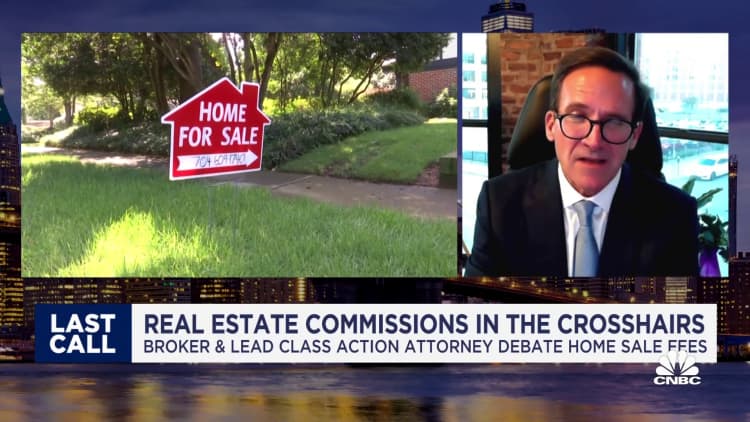Fuse | Corbis | Getty Images
When buying or selling a home, a real estate agent's commissions can shave thousands of dollars off the sales price — but many consumers don't realize that you can negotiate these terms.
Nearly a third, 31%, of home buyers and sellers have negotiated commissions with their agents, according to a new report from LendingTree. The majority of them, 64%, succeeded in reducing fees. LendingTree surveyed 2,034 American adults in mid-January.
About 36% of homebuyers and sellers say they didn't know they could negotiate a real estate agent's commission.
More personal finance:
Aspiring homeowners say they face two major hurdles to purchasing
H&R Block used deceptive marketing and deleted a tax filer's data, an FTC complaint alleges.
Here are ways to live without a paycheck after a layoff
That's understandable: When buyers budget for the costs of a new property, they often focus on the bigger things, like the down payment and mortgage, said Jacob Channel, chief economist at LendingTree.
“Real estate commission fees are one of the less glamorous or less talked about parts of the home buying process,” Channel said.
“Thoughts like how much a real estate agent will get or who pays the real estate agent may not be at the forefront of your mind,” he said.
How do real estate agent commissions work?
In 2023, the average commission was 5.37%, LendingTree found. Rates typically range from 5% to 6%, which equates to thousands of dollars, and profits are usually split evenly between the buyer's and seller's agents involved in the transaction. The seller usually pays those commissions at closing.
The median home sale price by the end of 2023 was $417,700, according to the Federal Reserve. This means that commissions at 5.37% amount to $22,430.49.
However, 48% of home buyers and sellers don't know how much commission their agent earned for their recent home transaction, according to LendingTree.
“The experience of buying and selling homes can be very overwhelming,” Channel said. “Unless you're paying close attention, it's very difficult to come up with a detailed list of exactly what you've spent and exactly where you've spent it.”

Some home sellers avoid these fees altogether by selling the home on their own. Homes for sale by owners account for 10% of home sales in 2021, according to the National Association of Realtors.
Technology has made it easier for Americans to buy and sell real estate on their own through online marketplaces. But the channel said they may end up dedicating more time and energy than they initially expected or they may make the process more complicated.
“[Real estate agents] They do a lot of work behind the scenes and it's not necessary [or] Immediately visible to buyers and sellers.
Agents are often familiar with local housing market trends, know how to sell a property for a higher price and are familiar with the necessary paperwork involved in the deal, Channel said.
“All housing markets have their individual quirks,” he said. “If you're a seller and you try to do it on your own, you might miss something or … not put yourself in a particularly strong position to get a good deal to sell your home for as much money as possible.”
How to negotiate real estate agent fees
While real estate agents should be clear about their fees, buyers and sellers should be sure to ask questions about what they charge and why. An agent's price often depends on factors such as the type of property and how easy it is to sell.
“Keep in mind that agents’ livelihoods depend on the commission fees they charge,” Channel said.
If you find an agent you like but are worried about the cost, see if you can work out a deal or get a discount. You may have more negotiating leverage if your home is desirable, of high value, or if your local market is hot.
Search for different agents in your area and compare their fees. So-called low-commission agents may offer fewer services, but they charge commissions as low as 1% to 1.5%. Others work on a fixed fee basis.
If you're working with a dual agent, or a real estate agent who represents both the buyer and seller, you might point out to them that they don't have to split the commission with anyone. Even with a slightly lower rate, they would likely get more money if they split 5% with a second agent, the channel said.
An antitrust lawsuit could have a ripple effect on fees
As of now, the home seller is responsible for paying both their agent and the buyer. But this could change if a lawsuit is filed.
In an antitrust lawsuit last fall, a federal jury found that NAR and several major real estate brokerages conspired to artificially inflate agents' commissions. As a result, NAR, Keller Williams, and HomeServices of America are liable for approximately $1.8 billion in damages. Re/Max and Anywhere Real Estate settled before trial, each paying damages.
“Last month, NAR filed motions asking the court to vacate the trial ruling and enter the ruling as a matter of law in favor of NAR or, at the very least, order a new trial. These motions are part of the post-trial process. “We expect a new trial,” a NAR spokesperson told CNBC in a statement. Sentencing them in a timely manner.
A spokesman for HomeServices of America declined to comment
Keller Williams settled for $70 million in early February.
If the ruling is issued, it could mean the home seller would not be required to pay the buyer's agent, experts say. More buyers may bypass agents, or try to negotiate fees.
“We hope this gives us more transparency,” Channel said. “This shows…why it's important to pay attention to all the costs when you go to buy or sell a home.”
Don't miss these stories from CNBC PRO:
